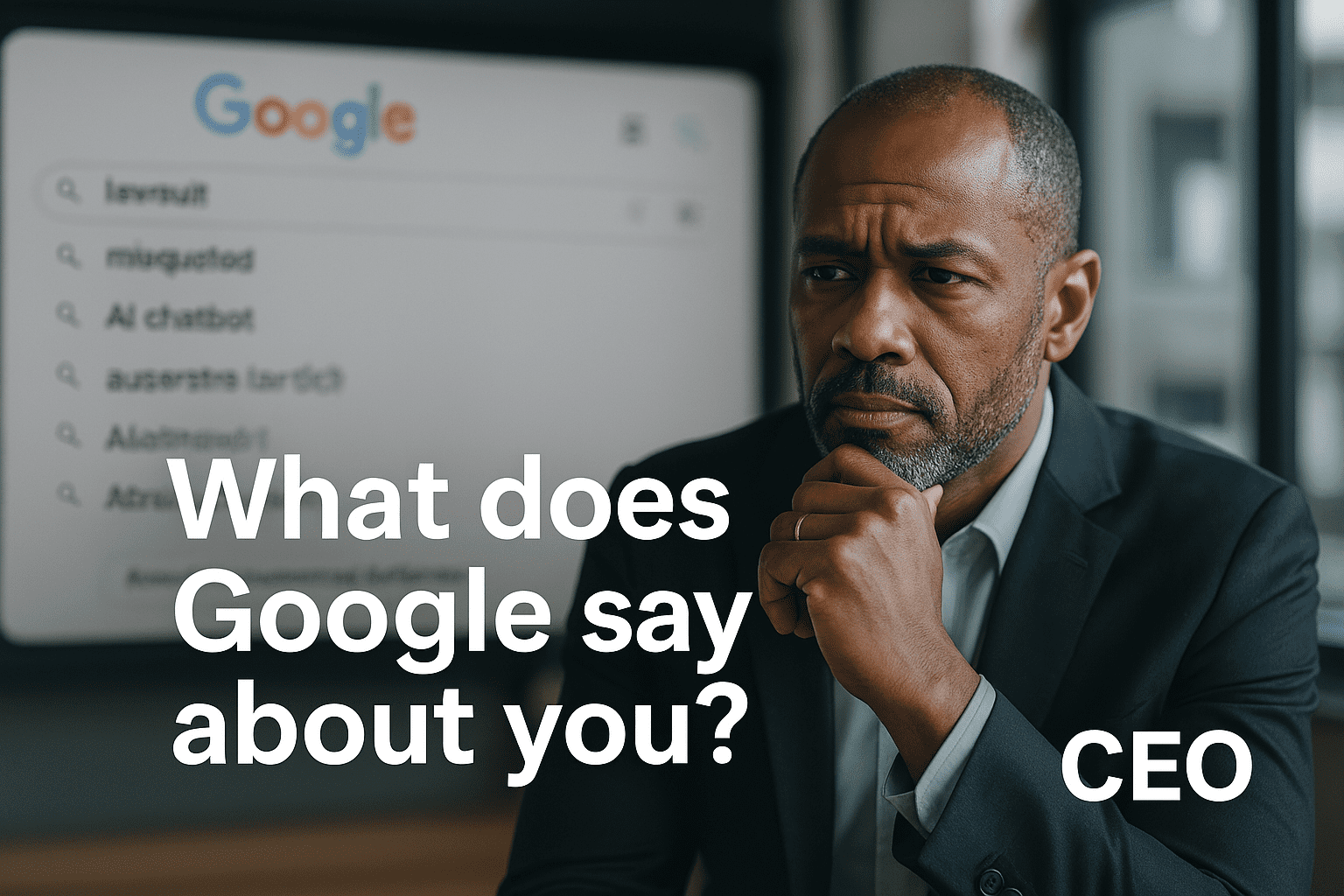Last Updated on August 2, 2023 by Steven W. Giovinco
Questions about online reputation management answered
See Related Article: Calculating the Value of Online Reputation Management
“What is online reputation management?” and “How do you do it?” are common questions. But there are many more, ranging from how long does it take, what can be removed, and a bunch of others. Here are the top 14 questions and answers about online reputation management that I frequently hear from clients.
What is online reputation management?
Online reputation management is everything about you or your business that shows up online. This includes websites, blog posts, social media, and images. But in practical terms, it’s anything about you that appears in Google search results. If negative links show up, it is important to push them off the first page. A good reputation shows you are an expert in your field, which translates into getting more business–resulting in more site traffic and more sales. A bad link could mean the loss of clients and prospects.
How do you fix a damaged reputation?
The best way is to use English (or whatever your native language is): write good information. Inundating the web with great and original content works best and will eventually push the negative links off the first page of Google searches.
While it might be possible to remove negative links, images, and content (see below), the best approach is to create targeted, effective, and well-formulated content, including blog posts, photos, and videos. But the key is developing a strategy, which includes researching and creating the best content and knowing which platforms to share it on.
Why is having an excellent online reputation necessary at all?
Probably the first thing people do, even when speaking to you on the phone or just after meeting you, is conducting a Google search.
Because the Internet is the new first impression, and people don’t ask for references, they head to Google. Something negative out there can damage your life and business quickly. Nearly as important, having no reputation drives clients to competitors.
What are ways a reputation can be damaged?
There are a bunch of ways. Someone can write something negative about you in a blog post, which is relatively common, unfortunately.
There are complaint sites where people can anonymously post comments for a business or a person, such as RipOffReports, and these are very powerful. Also, there are some inventive ways used to damage a reputation. A disgruntled ex-client or fired employee sometimes takes over or hijacks a domain name to post bad things about them, such as “JohnSmithIsACrook.com”–and this shows up very quickly on the first page of Google. One last thing: what if you have the same name as someone with a bad reputation or something in the news? This could inadvertently impact you even though you did nothing wrong.
What can happen if someone writes something negative?
Frankly, it could be highly damaging if it shows up on the first page of Google. I’ve spoken to lawyers, small business owners, photographers–whoever–who could not continue and lost their business.
I had one client who was a charity, but because one negative article was written about him and lumped him in with unscrupulous companies, he lost everything, including his house.
Who does this?
An ex-employee, angry at being fired, can write something; a disgruntled client, unhappy at the results, or anyone that had a bad day and wants to retaliate.
But remember, what someone writes could be valid–if that\’s the case, listen and work to correct the issue.
What should you do if something negative shows up?
You probably will be angry, upset, and want to retaliate by writing something negative yourself. Don\’t: it will make things worse. Instead, come up with a strategy.
Start by asking this question: Is the issue warranted? If so, address it and professionally write back to the author–perhaps, but it could just fan the flames even more.
Most importantly, work on writing good content, and be very active on social media. These will all eventually push the negative information down off the first page of Google.
Should you be preemptive, and how?
Make sure you have claimed your domain name and have a website, but just starting with a simple blog will do.
Also, create social media presences on LinkedIn, Twitter, Facebook and, connect with other leaders and get them to share your Tweets. This will act as a buffer if anything wrong shows up on the first page of Google searches.
What are practical ways someone can improve their reputation?
The best thing to do is to create a blog and start writing. Spread the word by reporting information that your clients or readers want to know about, such as recent developments in your industry, developments at conferences, frequently asked questions, etc.
Also, get active on social media. Beef up and often post on LinkedIn, Twitter, Facebook, Pinterest–a great site based on images–and maybe others specific to your industry. Add your name to Wikipedia or college sites, if you can as well.
Once something is online, is it there forever?
Basically, yes. Because about 92% of people don’t go beyond the first page, pushing the negative information off the first, second, or third pages effectively makes it disappear. It is usually impossible to remove once it’s on the web–but always try.
Some people are afraid of having a bad reputation or getting reviews, so they stay offline. Is this a good idea?
Hiding from the web won’t work. Having no online presence makes you vulnerable to attacks or problems.
If something negative shows up, it will go right to the top of a Google search, which is not good.
For example, I had a financial consulting business as a client who had little or no online presence, and because they did not show up on the first page of Google search, they were losing business to a competitor. The benefits include protecting your name and brand, controlling your business identity, and providing the best image of your company. There are no shortcuts–just hard work and well-crafted content.
How long does it take?
This usually is a long-term process, taking an average of about six months. Google constantly changes its algorithms, and there is no magic button–it\’s just hard work.
How much does it cost?
The investment can easily cost a few thousand dollars a month or more, so you have to determine if it’s worth it to save your business. Most people understand that it’s better to repair their reputation rather than close up shop.
How did you start in this business?
I like helping people. I’m a small business, and I know what it\’s like when you are your brand. I was doing social media and search engine optimization, but frankly, it was hard to prove results. Online reputation management is precise. If those negative links are on the first page, that’s bad; if it’s cleared up, that’s good. And it’s very satisfying to know that I can make a difference and see those wrong links move down month by month.
Questions?
If you’ve any questions, please reach out to me, Steven W. Giovinco at Recover Reputation. Share this article if you found it helpful.
See Related Article: 25 Free Online Reputation Management Tips and Tools




